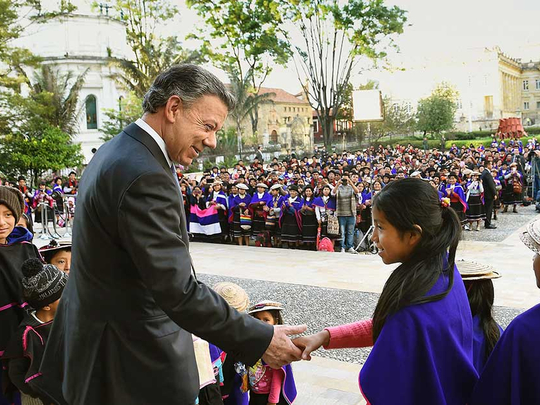
Right now, more than 300,000 people are very disappointed. In all likelihood, the number is most probably in the tens of millions. Why? Because the Syria Civil Defence, more widely known as the White Helmets, did not win the 2016 Nobel Peace Prize — despite the hundreds of thousands of signatures on a petition.
Instead, that honour went to President Juan Manuel Santos of Colombia. And that is exactly as it should be. Over the past five years, the White Helmets have pulled at least 60,000 people out of the burning rubble that once formed their homes, mosques and schools. These rescuers risk their lives every time they run towards the fire and the screams. They have lost 160 of their own volunteers. They have remained neutral in a conflict so protracted and complex that it has more ever-changing fractions than a kaleidoscope. And yet they did not win.
Their motto, “To save one life is to save all of humanity”, is a beautiful, simple creed that has helped their example of bravery and defiance amass support across the world. And yet despite that support, the bombs still fall in Syria. Even if 100 million people had signed the petition, the White Helmets would probably still not have won. The Nobel prize committee has bucked the bookies’ favourite every single year.
The 2016 decision is no exception in this regard, but it is exceptional in another way. For the first time in my lifetime, and perhaps more so than in its entire 115-year history, the prize has not been a reflective reward but an optimistic assertion that a particular peace is possible. Yes, Syria needs peace desperately, but awarding the Nobel Peace Prize to the White Helmets would not have reduced the horrors they face any more than it would reduce the number of children fleeing the turmoil and washing up on the shores of Greek islands — another widely tipped contender for the prize.
Awarding the prize to the White Helmets would not have reduced the horrors that the volunteers face in Syria In realpolitik terms, it would not have made a difference. No new sanctions would fly from the UN to Syria’s allies. The no-fly zone would not increase. Aid would not miraculously and suddenly get to those who need it.
The Nobel Peace Prize has limited power, depending on when it is given — in any given point in a conflict — and to whom. The fact that this award may be controversial will not surprise the committee. The prize has been controversial since its inception — creating a peace award in the name of the man who invented dynamite was considered antithetical at the time — but that controversy has been part of its strength.
Honouring Yasser Arafat was controversial in 1994, but standing him alongside Shimon Peres and Yitzhak Rabin neutered most of the criticism. This time around, though, it is just one side being honoured.
President Santos will receive the award alone. It will not be shared with the Farc leader, Timochenko — an omission that will not go unnoticed, and which was made deliberately. Colombians narrowly rejected the peace accords in last weekend’s referendum because they felt the guerrillas were getting too good a deal: so handing the notorious rebel leader a Nobel would not help convince the 0.2 per cent of voting Colombians needed to change their vote at a future referendum to do so. Not giving Timochenko the award while Santos does receive it, however, might.
For each year of the Syria conflict, there has been over a decade of fighting in Colombia. Each conflict can claim to have displaced more than six million, internally, and millions more beyond their borders. A quarter of a million lives have been snuffed out in Colombia over the last 52 years, but almost 400,000 Syrians have been killed in one tenth of the time. Yet this is not merely a numbers game. The Nobel prize committee had an opportunity today, just days after a hard-fought peace risked being lost in the Colombian jungle, to provoke peace and kick-start that process.
In so doing, they have demonstrated that where the international community may not always lend its support to securing peace in every conflict — Syria chief among them — they can sometimes provide the necessary momentum to see it through. Today’s Nobel Peace Prize for Santos is a vindication of a decades-long struggle from which I hope two things will happen. First, that the Colombian people will seize their next chance to affirm the accords. Second, that the world realises it can’t take 52 years to solve the crisis in Syria, for there will be no Syria left.
— Guardian News & Media Ltd
Ciarán Norris is Director of Rising Global Peace Forum, an international network and an annual event taking place in Coventry 15-16 November 2016, and has a decade of experience working in political, government and campaigning role










